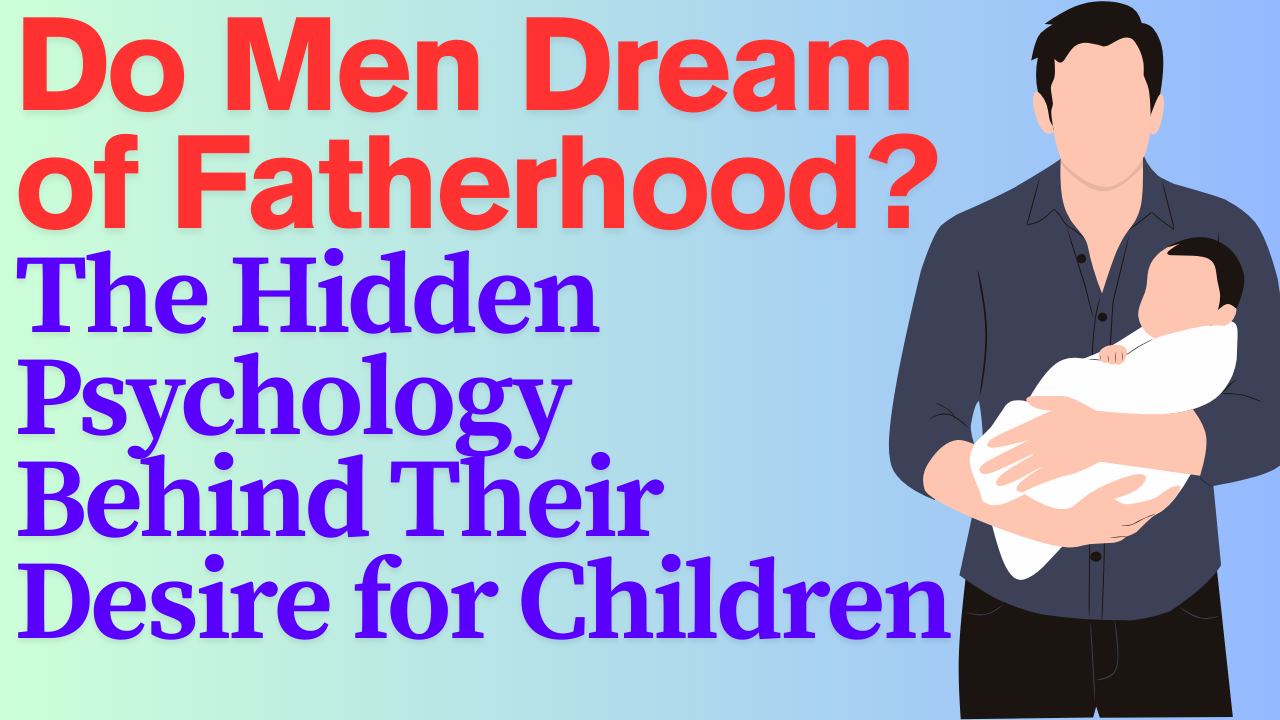Do Men Dream of Fatherhood? The Hidden Psychology Behind Their Desire for Children
What is noticeable about a man’s psychology when he wants to have children?
Is there an invisible clock ticking for him too, even though he is theoretically able to reproduce longer than a woman?
Are there any statistics or surveys that address the question of why many men do not have children at a young age and why some remain childless throughout their lives?
What motivates men to want a child if it is not their biological clock?
And is it really true that a man can become a father at any time, or is our imagination just fooling us?
How do men deal with it when it turns out that their desire to have children cannot be fulfilled from a medical point of view?
In this article you will find the answers.
Psychology of men who want to have children – Suddenly in their forties
This is how you can imagine it: There stands a man in the prime of his life and in his mid-forties.
The 50th birthday is approaching at a rapid pace.
After several jobs, he has now found a job that he wants to keep, but despite several relationships, he has not found a woman he wants to stay with.
Almost all of his friends have children and it has been years since he got used to the fact that the meetings and get-togethers are different than before.
However, the photos of the children that he keeps seeing on Facebook or Instagram trigger a strange feeling in him:
Doesn’t he have a huge gap in his resume? A void in his life?
Is it the social pressure to start a family that he cannot escape?
Or has his longing for a family of his own finally caught up with him? Is he now deliberately looking for a younger partner who wants a baby?
Psychology of men who want to have children – different body, different attitude
Men are often shocked when it turns out that something is wrong with their fertility. After all, their sexuality is functioning perfectly.
But if you keep putting off the decision to have children, you shouldn’t be surprised if life throws a wrench in the works.
But how is that possible? Late fathers aren’t such a rarity anymore!
Celebrities such as Heinz Hoenig, Jürgen Vogel, Robert de Niro, Georg Clooney and many more confirm the view that men always remain fertile and that nothing should stand in the way of late fatherhood.
While most women who get pregnant at 40 are surprised (or surprised) and those who dare to get pregnant at 44 are shocked, the idea of new fathers who are over 50 or 60 and could actually already be grandfathers hardly comes as a surprise.
However, women in their mid-thirties are considered to have a high-risk pregnancy.
Even after they pass this age threshold, biology forces women to think intensively about the desire to have children.
Not that it’s really necessary, after all, menstruation regularly reminds women that they can have children.
Men do not have such a physical awareness, as couple and family therapist Petra Thron emphasizes.
And in society, too, people don’t really talk about “risky fatherhood” or about the possible harmful effects of the father’s advanced age on the pregnancy and the child.
The celebrity examples of late fatherhood suggest that men shouldn’t worry.
However, the reality is different…
Psychology of men who want children – is fatherhood always possible?
Theoretically, it is not wrong that men can father children into old age if spermiogenesis continues, i.e. the testicles function and the man can ejaculate.
But that doesn’t mean it’s always okay to become a father late.
Researchers at Rutgers University in the USA have discovered through 40 years of research that men also have a ticking biological clock that can influence the health of both their partners and their children.
Most men are not aware of this at all, probably because society treats them differently than women.
The latter are even criticized by some if they want to have children after the age of 40, as if they were presumably condemning the new life they want to create to health problems and disorders right from the start.
If women over 35 don’t (yet) have children, they are often accused of having misguided life choices. Women still sometimes have to justify themselves if they don’t (want) to have children.
Or it is assumed that they suffered from such blows of fate that they lost their self-determination.
Many people believe that motherhood is part of women’s self-determination. This is different for men.
They are perceived as stubborn but courageous loners if family planning does not play a role in their lives.
When men don’t worry about having children, it’s often because they believe they can become fathers at any time.
But this raises a very pragmatic question: Which woman should be the mother?
Christian Schmidt, a demographer and sociologist at the University of Rostock, believes that older men very rarely meet fertile women (the reality is quite different from that of celebrities).
The average age difference is about three years.
And if you haven’t frozen your sperm, even as a man after the age of 40 you will have to deal with a decline in fertility.
And unlike women, men are far less informed and attentive to their reproductive health, which demonstrates a certain irresponsibility.
Psychology of men in the desire to have children – advanced age of the man as a risk for woman and child
It is therefore recognized that physical changes after the age of 35 in women can affect not only conception and pregnancy but also the health of the child, but there is still a great need for education for men, who can experience similar effects in advanced age.
However, doctors do not agree on what “advanced age” means.
Doctors have been discussing this for some time, and estimates of what constitutes advanced age range from 35 to 45. Sperm quality already begins to decline during this period.
The Center for Reproductive Medicine and Andrology at Münster University Hospital is also aware of the potential risks of late fatherhood.
And one is also aware that the influence of the father’s age has been neglected.
Stefan Schlatt, director of the center, explains how such neglect came about: Women are born with a certain number of immature eggs – about 400,000 per ovary.
This pool is therefore limited and ages steadily from the first day after birth.
Men, on the other hand, produce millions of new sperm every day throughout their lives, which is why it was assumed that they do not age.
However, according to Schlatt, epigenetic and genetic changes do occur in sperm over the years, which impairs their DNA integrity.
This can have a detrimental effect on the development of the pregnancy and the baby.
A study published in the British Medical Journal in 2019 examined the impact of parental age on the health of women and children, evaluating more than 40.5 million births in the United States between 2007 and 2016.
Several pieces of information about the individuals were collected, such as nationality, social background and education, and the age of the fathers was also asked.
Researchers found that premature births (where the pregnancy lasted less than 37 weeks), low birth weight (less than 2,500 grams), the need for respiratory assistance after birth, and the occurrence of seizures occurred.
Babies had to be taken to the neonatal intensive care unit and given antibiotics.
Pregnancy poisoning and gestational diabetes occurred in expectant mothers , with this being more likely to occur as the fathers grew older.
The risk of these diseases increased by 28 percent for fathers aged between 45 and 54 and by 34 percent for those over 55.
It is evident that the father’s advanced age can lead to complications for both mother and child.
According to previous studies, there is even a connection between illnesses such as schizophrenia and autism and the father’s advanced age.
So not only women, but also men have to consider whether they are prepared to accept a child with a disability if they become parents later in life.
The responsibility is great, so it is a good idea to consider genetic counseling and risk assessment at a later age.
Or a man can take precautions and have his sperm frozen until the age of 45 at the latest.
This process is called cryopreservation and is recommended by medical professionals who are concerned about the increasing number of aging parents.
Psychology of men who want to have children – men tick differently than women
In 2014, the Federal Ministry for Family Affairs, Senior Citizens, Women and Youth published a study on voluntary and involuntary childlessness, which shows that 57%, or more than half, of men between the ages of 30 and 34 are childless.
32% of 40- to 44-year-old men and 27% of 50- to 54-year-old men have no children of their own. About a quarter of German men remain permanently childless. What’s going on?
Did it just not work out? Did these men not find the right partner?
Are they “procreation strikers” out of similar convictions as working academics? Or have these men delayed the decision for too long?
If infertility has nothing to do with it, then according to demographers and sociologists, two groups of men can be distinguished who do not have children for various reasons.
On the one hand, there are those who do not earn well and, as low earners, have fewer chances of remaining in a stable relationship in which having children becomes an option.
Their socioeconomic situation makes them unattractive for the role of father.
No, women usually don’t want to be the main breadwinner, even though many men still see themselves as such, but they also don’t want to be the main earner and run the show for the whole family.
The second group corresponds more to the cliché of the restless man who wants to try out new things in life.
However, the matter is far from as crude as it seems. Men generally also want to have time for their children if they choose to do so.
At the same time, however, they are often unwilling to scale back their careers and professional commitment and, for example, go part-time, which is much more common among women.
In addition, most men still expect that they remain the working parent and that the woman mainly takes on the role of caregiver and educator and takes good care of the children as a “good mother”.
For men with high professional qualifications, starting a family is only an option when their partner feels ready to put work and career on the back burner.
They often have other plans and career goals that they want to realize and achieve, but, often unlike what they know from their own fathers, they definitely want to have a lot of time for their children “later”.
But not yet. Career comes first.
Despite changing gender roles, there are still very few men who share household and child-rearing responsibilities equally with their partners and take on half of the responsibility.
The traditional idea of masculinity and fatherhood is still deeply rooted in society.
Family researcher Martin Bujard from the Federal Institute for Population Research (BiB) explains that for individualistic, flexible and extremely career-conscious men, the consequence is often that biology has the last word.
Because if men between 30 and 40 are not professionally secure, i.e. do not have a permanent job, but commute more for projects or are not yet willing to commit to a solid relationship, then they often remain childless.
But there is something else that is high on men’s priority list, as sociologist Claudia Zerle-Elsäßer at the German Youth Institute explains, which may surprise some readers.
Unlike women, who generally have an inner desire to have children and want to see this realized by a suitable partner, men often only develop a desire to have children when they feel they are with the right woman.
And they often only make these decisions late.
Psychology of men in the desire to have children – men suffer no less than women from involuntary childlessness
Men do not face a drastic upheaval like women do with menopause, which means a brutal end to their fertility.
In return, however, they suppress the confrontation with their own feelings and avoid the grieving process, as psychotherapist and author Björn Süfke explains.
And you don’t even have to have an unfulfilled desire to have children to develop feelings of grief.
The psychotherapist knows that every opportunity in life that we have missed and not realized deserves to be mourned.
Some men attach an ultimatum to the possibility of becoming a father, without considering the consequences, such as setting an age limit by which they will either have children or give up on the idea altogether.
Fertility treatment is out of the question for them. This, of course, doesn’t represent a confrontation with their wishes and fears.
If your desire to have children is unfulfilled, you have to think about how else you can give (new) meaning to your life and become fruitful outside of the family project.
There are numerous alternatives you can pursue. The classics would be writing a book, traveling a lot, or volunteering.
The question of meaning does not only affect childless people and partnerships, but also mothers and fathers who have raised their children and now find themselves in an empty nest.
After the initial disorientation and confusion, it’s time to start a new project.
Ideally, it fulfills both people in a relationship and can revitalize it.
Parents in this phase of life can learn from childless people, because the latter have usually found meaning in life in completely different things and can provide answers to questions that parents with adult children may be asking for the first time.
By the way, it is not true that men suffer less than women when they find out that they will never have the child they want.
Only in recent years has research begun to examine the emotional state of men who are involuntarily childless.
Of course, women are also directly affected physically by the issue, which is one of the reasons why the interest has so far only been directed at women.
In addition, it was actually thought for a long time that men suffer less when they have an unfulfilled desire to have children.
However, recent research shows that this is not true and that men withdraw emotionally when faced with such a loss and use other, less obvious coping strategies.
For example, one study cites the case of a couple in which the woman retreats into her own four walls after a miscarriage, while the man prepares to renovate the kitchen.
At first glance, this seems like an insensitive reaction. But it’s by no means indifference; rather, it’s an attempt to regain control over a situation in which he can do nothing.
Hardly anything torments as much as powerlessness and helplessness.
Family therapist Petra Thorn is familiar with such cases from her counseling practice and knows that this type of activism is a coping strategy.
Women are more likely to feel the need to talk about the issue, while men are less likely to be able to handle it.
Ultimately, talking doesn’t lead to a solution and everything just goes around in circles.
That’s why the family therapist recommends a compromise: You decide that you’ll talk about the matter for half an hour a day, for example, and no more.
Some men suffer more than others from unfulfilled desire to have children.
The cultural background they come from plays a significant role, as studies have also shown.
Men from traditional societies are hit much harder by childlessness than those from progressive societies.
In some places the topic is even taboo and leads to men being ashamed and unable or unwilling to talk about it.
In addition, men often feel their masculinity is hurt when it turns out that the biological causes of childlessness lie within themselves.
It is a blow to a man’s self-image when he learns that he is infertile.
Since fertility treatment puts a strain on the relationship, couples should definitely define together beforehand where the limits of their efforts lie.
These include questions about the amount of in vitro testing you want to do, alternatives such as adoption or a plan B.
Fortunately, there are couples who lead a beautiful life despite their unfulfilled desire to have children and who have managed to bury this longing and replace it with another, equally meaningful life project.
Social research also has encouraging findings, namely that people in childless relationships are no less satisfied with their lives in the long run.
Psychology of men who want to have children – Personal reports from men
Unlike the results of studies and surveys, individual stories provide a more accurate and diverse picture of reality.
That’s why I have five stories here from men who are childless for various reasons.
Bernd, 41, educator, in a committed relationship
I don’t have children because I would be concerned about my partner’s health.
There’s a serious mental illness in her family that’s genetic and could flare up in her during pregnancy. I can’t cope with the risk.
In addition, in recent years I have been busy working as a freelancer and building my own business, so the timing was also bad.
I’m doing pretty well. As an educator, I interact with children daily and fortunately, I don’t see childlessness as a painful gap in my life.
In addition, my partner and I made the joint decision to live without children.
Now we are both over 40 and aware of the finality of our decision.
Of course, there are moments when I ask myself questions and think about what our life would be like with children.
But these mostly brief reflections are not painful and are quickly replaced by thoughts of the advantages of our lives.
Finally, we use our free time for hobbies and travel and enjoy the peace and quiet after work.
I am particularly happy to retreat to my quiet home after wonderful, but also exhausting, days at daycare.
Besides, there are children in our lives, as we both have nephews and nieces, and we also see the children of our friends regularly.
Alexander, 52, flight attendant, in a steady relationship
Having my own children never fit into my life plan. Since I work as a flight attendant, I’m constantly on the move.
Even though it is often tiring, I enjoy traveling and my job.
I never really imagined what it would be like to be a father. I could never see myself in that role.
When I was young, I found the political situation alarming and thought I shouldn’t bring children into this world. I still hold a similar view today…
Yes, there have been a few women in my life with whom I could easily imagine having children.
About fifteen years ago, on a romantic night by the sea under the stars, I even decided to do so, but conception never happened.
And I realized I was relieved about it. Afterward, three relationships even failed because the women wanted children.
I didn’t want to pretend that it wasn’t the right time, but I spoke plainly: I don’t want children.
I have now been together for several years with my partner, who is the same age as me and who has an adult son from a previous relationship.
So having children was never an issue for us and I feel very comfortable with it.
I am also very happy that my partner has fulfilled her wish to have children and I don’t feel like I have deprived her of anything.
Sometimes I wonder what it would have been like if we had met twenty years ago. And how it would feel to show my own child the world.
But I don’t think anything of it, except that it’s human to sometimes think about unperceived possibilities.
Pavel, 47, prop master, married
The woman I love already had a daughter from her first marriage ten years ago when we met.
Although we wanted to have children together, there were such complications during her first pregnancy that the doctors advised us against it.
Even though I’m still sometimes sad that we don’t have a child together, I was still lucky because her daughter and I grew very fond of each other over time.
After school, she enjoys helping out with everything in my workshop and considers it a hobby. Perhaps she’ll become a prop master herself.
The biological father plays a minor role, as he never showed any interest in his daughter. So, I fulfill the father role myself and feel comfortable doing so.
It’s amazing how close you can become when you work on something together. And it fills me with pride that the girl looks at my work with such appreciation.
I sometimes catch myself thinking that things probably would have been different if I had had a child of my own. I don’t know where this thought comes from.
But it shows me that I have come to terms with my situation and am aware of its advantages.
Volker, 40, theater critic, single
The topic of children simply isn’t part of my life. I can’t imagine working in any other way than freelance; I don’t want to miss the spontaneity in my life. Besides, my relationships so far have been rather short-term.
Sometimes I think that I’m sabotaging myself and that I’ll regret my lifestyle later.
Especially when friends talk about their children and explain that being a father is the best experience they have ever had.
In fact, everyone in my circle of friends agrees. And all of my friends have children.
Then I become thoughtful. I wonder what my life will be like in old age, without the family I created myself.
Or whether I will ever be in a stable, long-term relationship, because over time you become more and more stubborn and it is difficult to get involved with someone else.
Even though the search for a partner becomes less romantic with age, I find the idea of specifically looking for a woman who wants children repulsive.
All in all, I’m reassured by the fact that I’m a man and there’s still plenty of time left for children.
For example, a friend of mine became a father for the first time at 51, while his partner is 38. Such cases have become quite common these days.
So the topic isn’t giving me a headache yet.
Thomas, 55, company boss, married
My wife and I wanted to have children, but it turned out that she couldn’t get pregnant naturally, so we went into fertility treatment.
After five years of unsuccessful attempts, we decided to give up.
Of course, I’m still sad about it. I’ve always wanted to have children, probably because I come from a large family myself.
My wife felt the same way. When we finally tried for pregnancy and ended up in fertility treatment, it caused a lot of stress and was a huge burden.
The operations she had to undergo were also physically very stressful and I found it difficult not to be able to take that away from her.
Added to that were unfriendly reproductive medicine specialists who showed no sensitivity. I think we’ve endured that long enough.
In fact, the joint decision to close the chapter of starting a family has strengthened us as a couple and brought us closer together.
This is also a good thing because society (still) judges (and condemns) childless couples.
People wonder who is to blame for us not having children, whether it is our age or whether we are selfish.
Fortunately, neither I nor my wife feel the need to justify ourselves. Let people think what they want.
We have been able to enjoy our lives again for a few years now and have found a replacement for the gap in.
As sponsors, we accompany a girl intensively, pass on something of ourselves and nurture our fatherly and motherly side.
Final thoughts
For women, it has long been socially accepted that there are increased risks for pregnancy and the baby as they get older.
In men, however, sperm do not age, which is why it is generally assumed that men can become fathers throughout their lives.
However, I have explained in this article that this is not the case and that there is still a need for clarification.
From the age of 45 onwards, there are health risks for the wife and child, so men who are undecided or who always postpone the decision should have their sperm frozen before the age of 40.
Unlike women, men often develop a desire to have children when they feel they have found the right partner.
As a rule, however, men want to be professionally secure and have already gained a lot of experience before they decide to start a family.
And even though the topic of gender equality seems to be on everyone’s lips, most men expect women to put their jobs and careers on hold to become mothers, while they themselves are not prepared to do so.
On the other hand, there is a prejudice that men suffer less than women when their desire to have children is unfulfilled, but research shows that this is not true.
Here you will also find personal accounts from childless men who speak out on the subject, some of whom have an unfulfilled desire to have children but have managed to find a substitute project in life that provides fulfillment.






